


This article offers heart-friendly dietary tips specifically designed for seniors, aiming to enhance their cardiovascular health and overall well-being. It's vital to consider how our food choices impact our hearts, especially as we age. By incorporating nutrient-dense foods like fruits, vegetables, whole grains, and lean proteins, we can make a significant difference in our health. At the same time, it’s important to limit unhealthy options such as processed foods and excessive sodium. Research supports that these dietary choices can greatly reduce the risk of cardiovascular diseases in older adults.
Have you ever wondered how simple changes in your diet could lead to better health? Embracing a heart-healthy diet is a powerful way to care for yourself. Imagine enjoying a colorful plate filled with fresh produce and wholesome grains—these foods not only nourish your body but also bring joy to your meals.
In addition to these delicious options, remember that small adjustments can lead to significant improvements. By focusing on what you can include in your diet rather than just what to avoid, you can cultivate a positive relationship with food. It’s about creating a balanced approach that feels sustainable and enjoyable.
Ultimately, taking these steps towards a healthier diet is an act of self-love. You deserve to feel your best, and making mindful choices about your nutrition can support that goal. If you have any questions or need guidance, please don’t hesitate to reach out for support. Together, we can navigate this journey towards better heart health.
Maintaining heart health is crucial for seniors, as dietary choices can significantly influence cardiovascular wellness. This article explores ten essential tips that promote a heart-friendly diet, tailored specifically for older adults. By understanding the importance of nutrient-dense foods, portion control, and hydration, seniors can empower themselves to make informed dietary decisions.
What challenges do they face in adopting these healthy habits? How can small changes lead to substantial improvements in their overall well-being? Together, we can navigate these challenges and embrace a healthier lifestyle.
At Amavita Heart and Vascular Wellness, we understand that personalized dietary suggestions, including a heart friendly diet, are vital for managing cardiovascular well-being in seniors. Established in 2017, Amavita—meaning 'love life' in Latin—embodies our belief that cardiovascular care should enhance the quality of life. We take pride in tailoring dietary plans that consider individual medical conditions, preferences, and lifestyle factors. This customized approach not only aids in managing existing cardiovascular issues but also plays a preventive role in maintaining overall cardiovascular health.
Our cardiologists emphasize that a well-organized heart friendly diet can significantly reduce the risk of cardiovascular illness and enhance the quality of life. For elderly patients, it is essential to incorporate nutrient-dense foods as part of a heart friendly diet, including:
Additionally, adopting a heart friendly diet by limiting saturated fats, sodium, added sugars, and processed foods can further promote cardiovascular wellness.
Effective dietary plans for older adults with cardiovascular concerns often involve regular meetings with healthcare professionals or registered dietitians. This ensures that nutritional approaches align with their evolving wellness needs. By prioritizing personalized nutrition, older adults can take proactive steps toward improved cardiovascular health and overall well-being. This commitment reflects Amavita's dedication to innovative and compassionate care, including our advanced outpatient procedures that allow patients to return home the same day.
Together, we can navigate your journey to better heart health, ensuring you feel supported every step of the way.
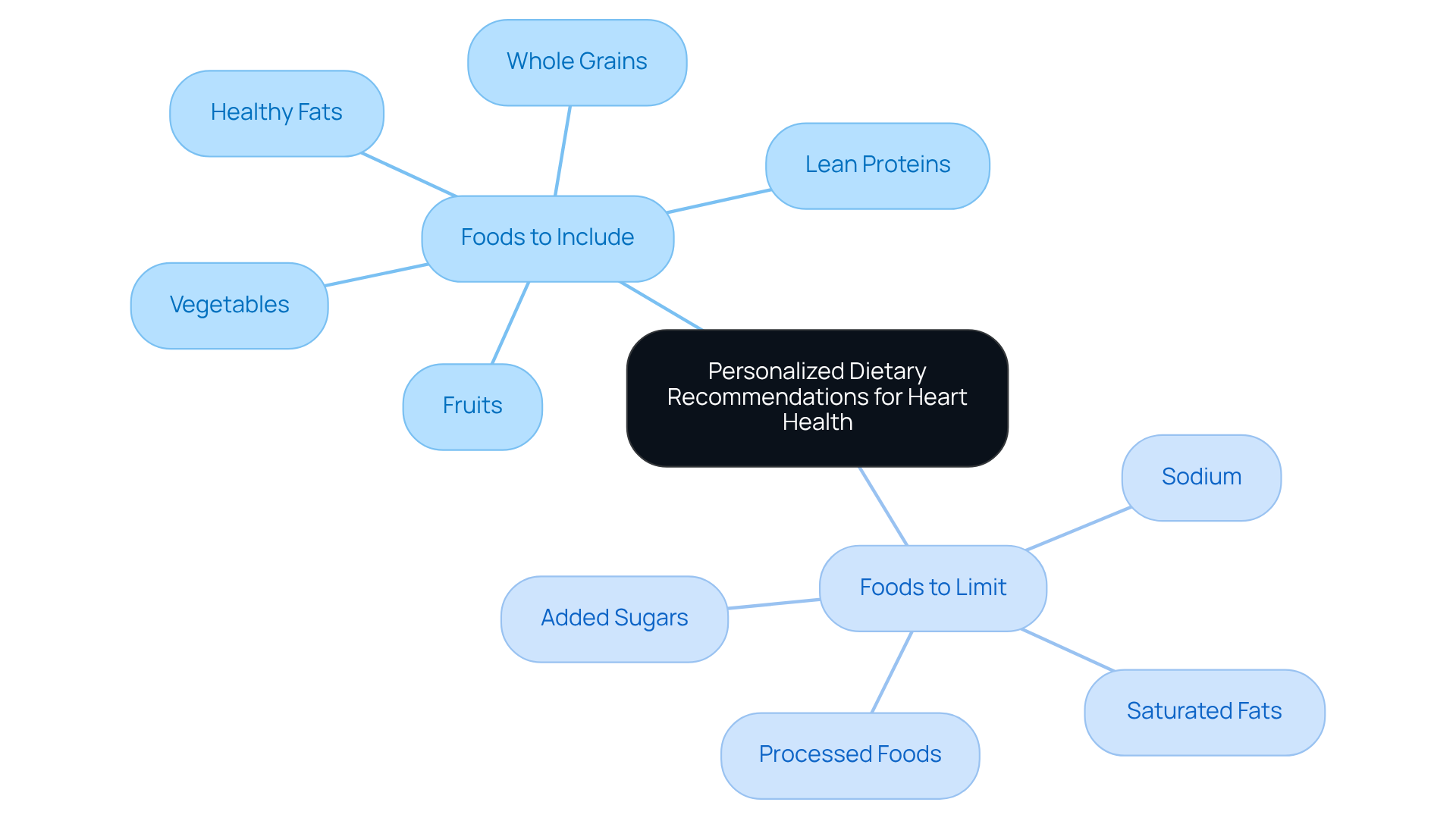
The Mediterranean eating plan is rich in nutritious fats, particularly from sources like olive oil and avocados, and it emphasizes the importance of fresh fruits and vegetables. This heart friendly diet has been associated with a lower risk of cardiovascular disease and stroke, making it an excellent choice for older adults. Have you considered how including foods such as nuts, seeds, and oily fish can provide essential omega-3 fatty acids? These nutrients are beneficial for maintaining a heart friendly diet.
In addition to this, moderate consumption of alcohol, especially red wine, is often recommended as part of this lifestyle, enhancing its overall approach to cardiovascular wellness. The Mediterranean way of life also encourages sharing meals with family and staying active, which can further promote your well-being. Recent studies, including those from the Luxembourg Institute of Health and Western University, show that long-term adherence to the Mediterranean eating pattern can lead to improved cardiovascular outcomes, such as lower blood pressure and better cholesterol levels.
To effectively incorporate Mediterranean-inspired meals into your daily routine, it may be helpful to consult with a doctor or registered dietitian. They can provide personalized guidance to support your health journey. Moreover, the anti-inflammatory benefits of the Mediterranean eating plan are crucial in creating a heart friendly diet, making it a sustainable and beneficial dietary pattern for older adults. Remember, taking small steps towards this lifestyle can make a significant difference in your overall health.

The DASH plan emphasizes the importance of low sodium consumption, inviting you to embrace a diet rich in nutrient-dense foods such as fruits, vegetables, whole grains, and lean proteins. Have you considered how lowering sodium can significantly help older adults manage blood pressure levels? This is crucial for maintaining cardiovascular health. Research indicates that high sodium intake is associated with elevated blood pressure, which can lead to serious cardiovascular issues.
In fact, the DASH eating plan has been recognized as the number 1 'Best Heart-Healthy Meal Plan' and 'Best Strategy for High Blood Pressure' in 2025 by U.S. News & World Report, highlighting its effectiveness. By adopting a low sodium eating plan, which recommends a daily intake of 1,500mg to 2,300mg, older adults can not only support their cardiovascular health but also enhance their overall wellness with essential nutrients. This balanced approach is particularly beneficial as it aligns with the dietary needs of the elderly and promotes a heart friendly diet, helping to reduce risks associated with hypertension and other heart-related concerns.
As dietitian Dr. Elizabeth Selvin wisely notes, "The DASH diet is flexible, effective, and widely supported by credible resources to help patients create meal plans that adhere to its guidelines." Implementing these nutritional adjustments can lead to significant improvements in cardiovascular health for older adults. Remember, you are not alone in this journey; support is available to help you make these positive changes.
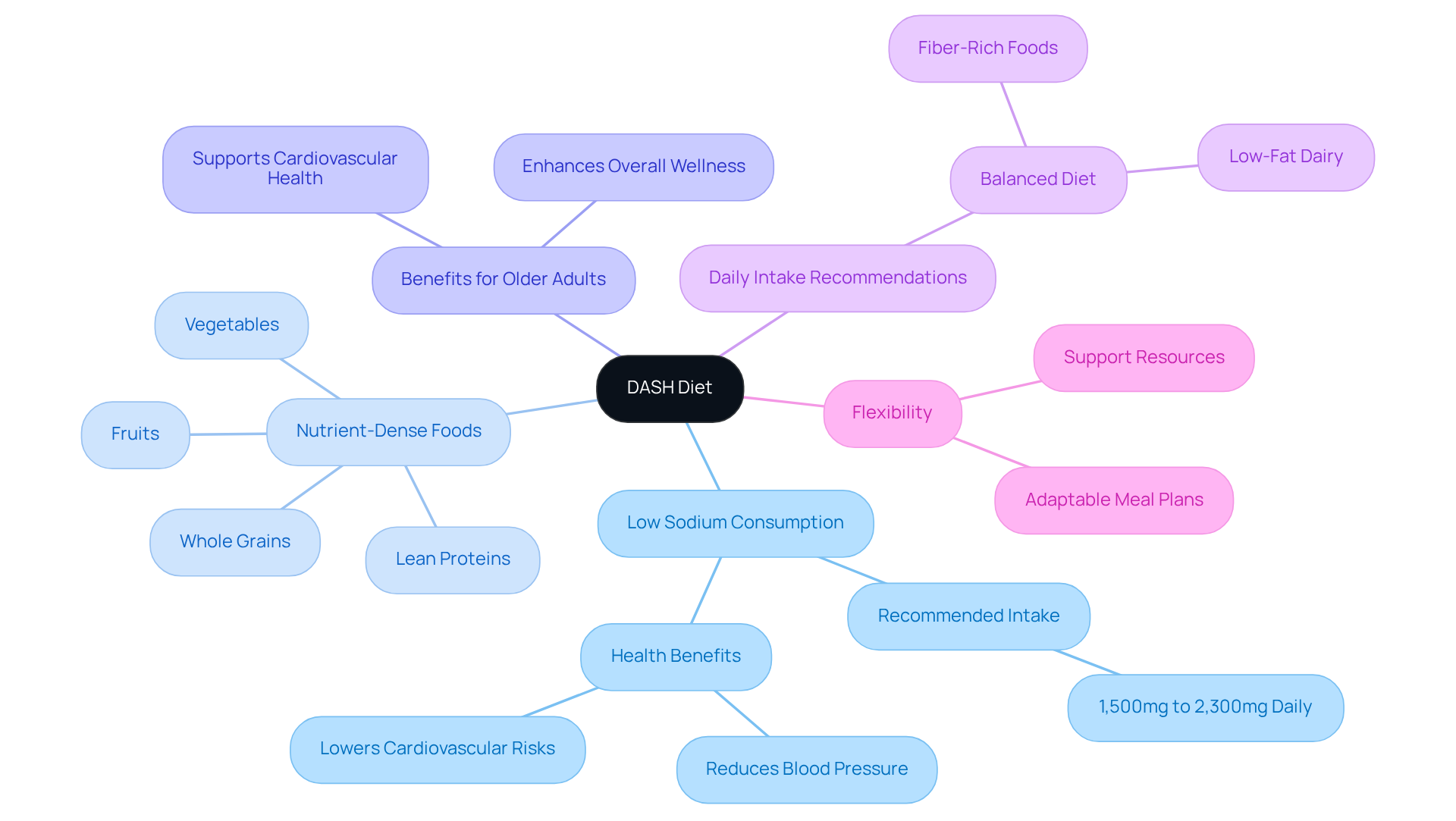
Whole grains, such as brown rice, quinoa, and oats, are wonderful sources of dietary fiber, which is vital for digestion and managing cholesterol levels. For seniors, these grains provide not just lasting energy but also support weight control, which is essential for maintaining a heart friendly diet. Have you ever considered how your food choices can impact your well-being? Recent studies reveal that individuals who enjoy at least three servings of whole grains each day tend to experience smaller increases in waist size, blood pressure, and blood sugar levels over time. This shift to a heart friendly diet can significantly lower the risk of heart disease, with higher whole grain intake linked to an 18% reduced risk of death from heart disease compared to those who consume the least.
Nutritionists encourage including a variety of whole grains in your meals, as they can enhance overall well-being and promote healthier cholesterol levels. Did you know that incorporating just 5-10 grams of soluble fiber into your daily diet can lower LDL cholesterol by 5-10%? Additionally, consuming 2 grams of plant sterols or stanols daily can further reduce LDL cholesterol by up to 10%. It’s important for older adults to limit foods like white bread, sugary beverages, and processed snacks to promote a heart friendly diet. By prioritizing whole grains, you can take proactive steps towards adopting a heart friendly diet, which improves your cardiovascular health and overall quality of life. Remember, every small change counts, and you are not alone in this journey.
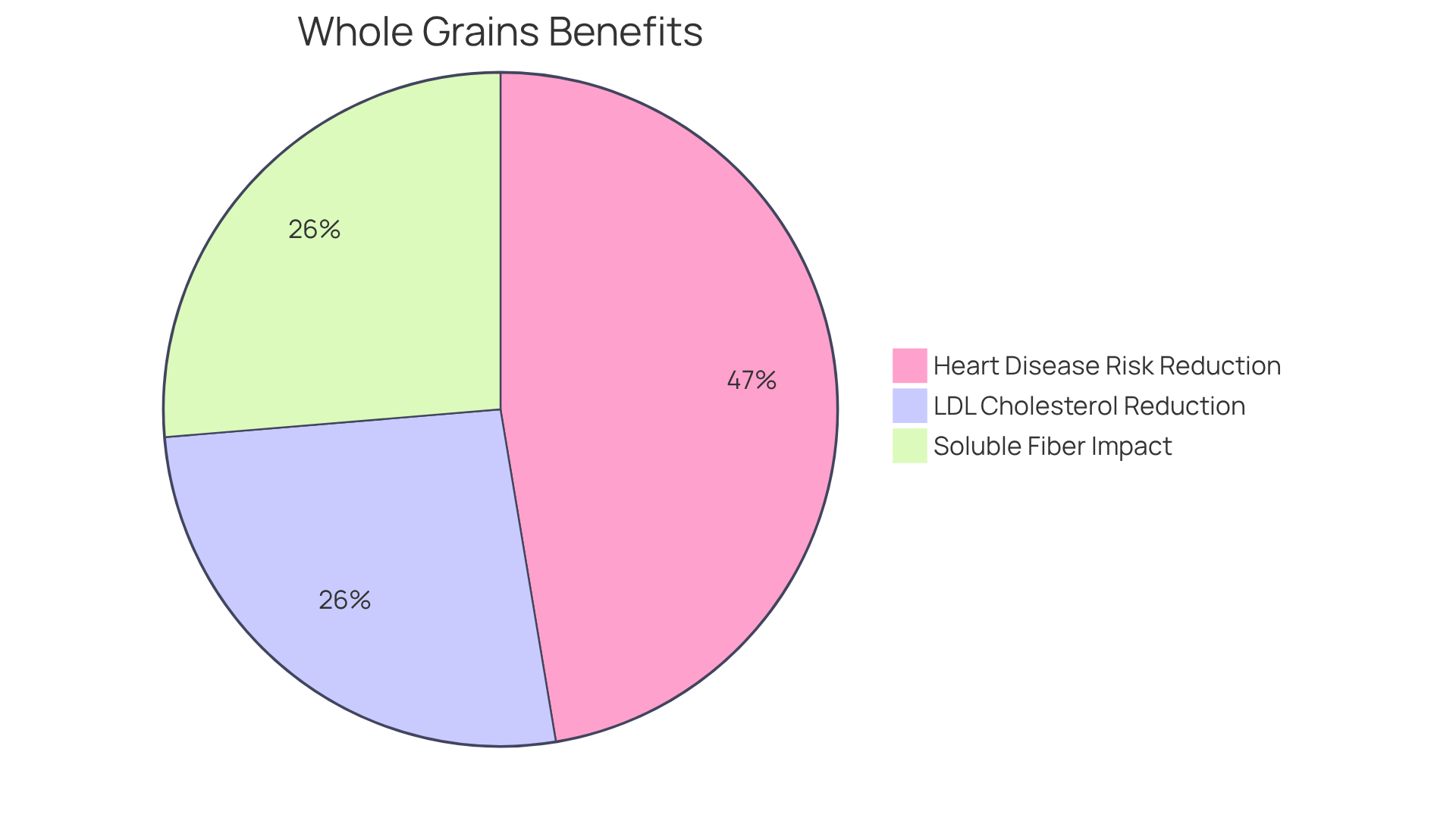
Including a lively assortment of fruits and vegetables in everyday meals is crucial for maintaining a heart friendly diet, especially for older adults. These foods are rich in antioxidants, vitamins, and minerals that play a vital role in reducing inflammation and enhancing heart function. Have you ever considered how vibrant fruits and vegetables, such as leafy greens, berries, and citrus, can be essential components of a heart friendly diet that significantly improves your heart health? Studies suggest that a heart friendly diet rich in these colorful options can greatly enhance cardiovascular metrics in older adults. For instance, research has shown that following a heart friendly diet rich in fruits and vegetables can lower indicators linked to cardiac damage, encouraging improved heart wellness results.
The American Heart Association recommends that older adults aim for a heart friendly diet by consuming four to five servings of fruits and vegetables each day to fully harness these wellness advantages. Furthermore, a heart friendly diet that is predominantly plant-based is associated with a lower occurrence of chronic diseases and enhanced overall well-being. Seniors are encouraged to fill their plates with a diverse selection of produce while considering cooking methods like grilling or steaming to enhance flavor and enjoyment.
It's important to acknowledge that some elderly individuals may face challenges in accessing fresh produce. However, exploring local markets or community programs can help overcome these barriers. By ensuring they enjoy both nutrition and flavor in their meals, older adults can significantly support their cardiovascular well-being with a heart friendly diet. Remember, taking small steps towards a heart friendly diet can lead to meaningful changes in your heart health.
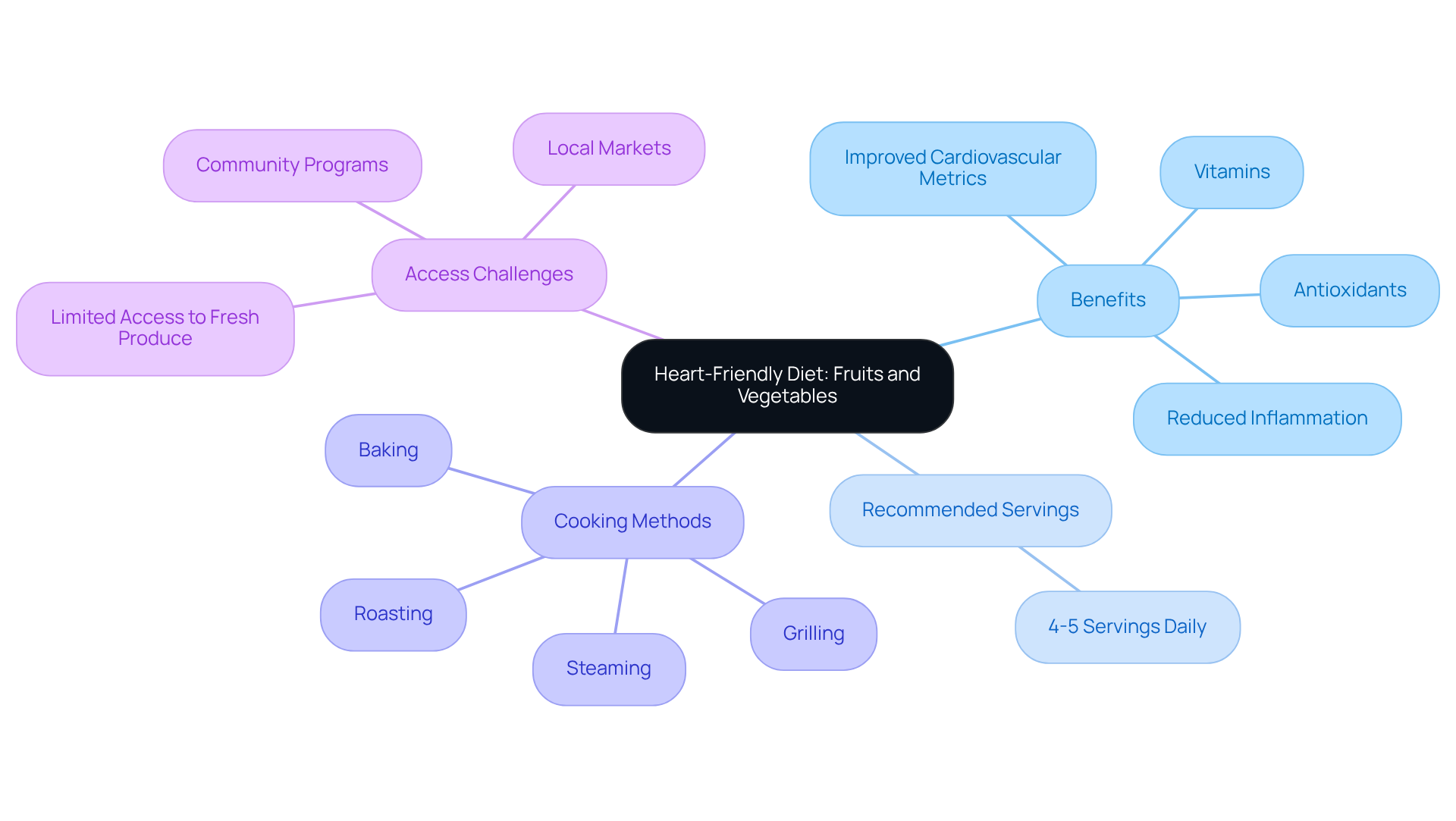
Choosing lean proteins, such as fish, poultry, and plant-based sources like beans and lentils, is particularly advantageous for seniors. These protein choices contain less saturated fat, which helps preserve muscle mass and promotes overall cardiovascular wellness. Have you considered how these simple dietary adjustments can make a significant difference in your health?
The American Heart Association recommends consuming 6 to 8 ounces of seafood per week, preferably oily fish like salmon and sardines. These options are abundant in omega-3 fatty acids, which are recognized for their anti-inflammatory characteristics and their ability to contribute to a heart friendly diet by reducing the risk of cardiovascular disease. Current studies show that regular intake of omega-3 fatty acids can greatly improve cardiovascular health in older individuals, aiding in enhanced circulation and decreasing the likelihood of cardiovascular incidents.
Cardiologists stress that these beneficial fats are vital for enhancing cardiovascular well-being. This makes fish an important part of a heart friendly diet for older adults. Additionally, incorporating unsalted nuts and seeds can further help lower total and LDL cholesterol, supporting overall cardiovascular health. Remember, small changes in your diet can lead to significant improvements in your heart friendly diet and enhance your heart health. If you have questions or need support in making these changes, please reach out for help.
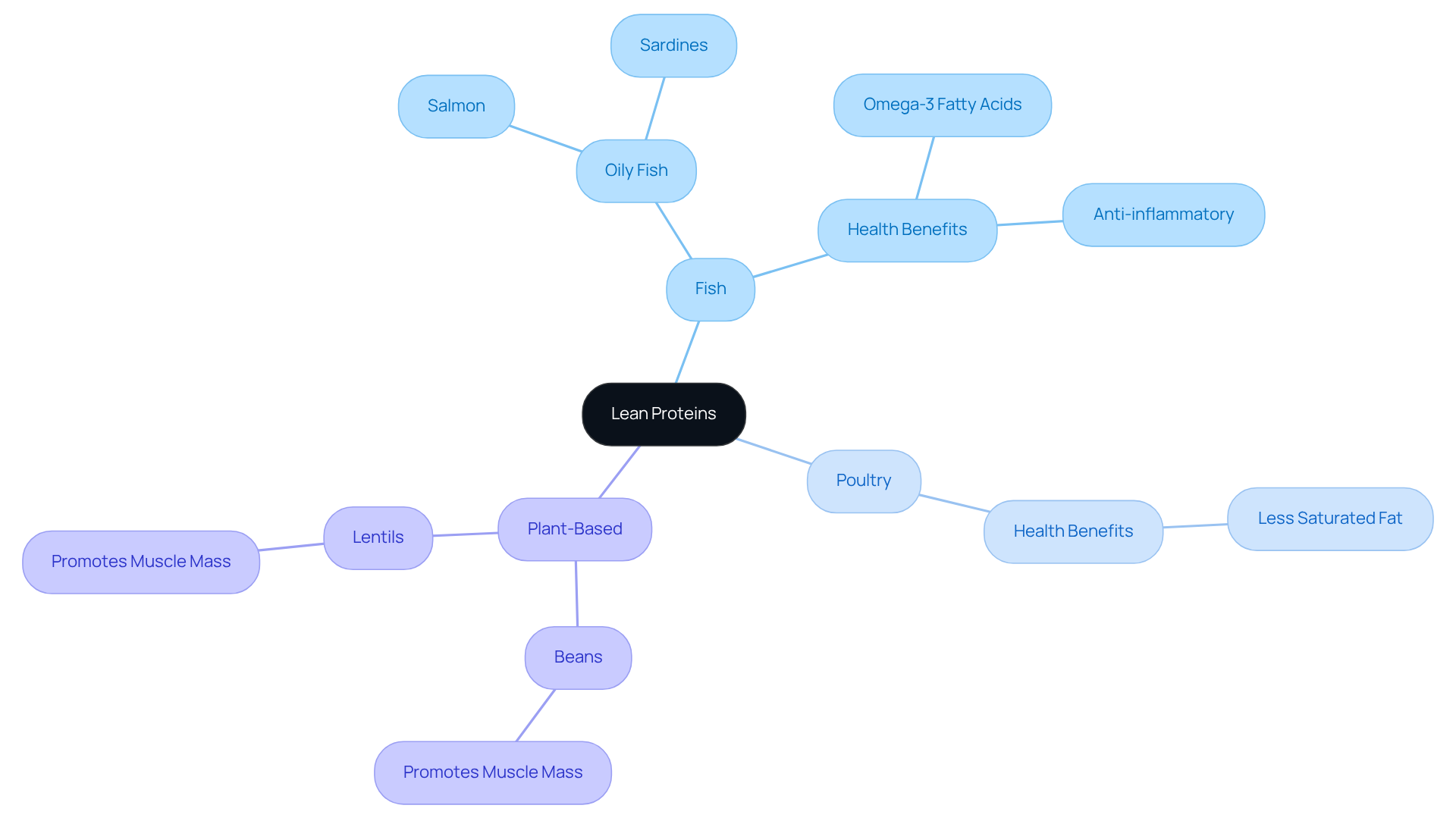
Incorporating healthy fats, particularly from olive oil and avocados, is essential for maintaining a heart friendly diet, especially for our beloved seniors. Have you ever wondered how these fats can make a difference? Research indicates that polyunsaturated and monounsaturated fats do not raise LDL cholesterol levels while providing vital fatty acids that enhance heart function. It’s a comforting thought that older adults can replace saturated fats with these healthier alternatives.
For instance, using olive oil for cooking or drizzling it over vegetables or salads can be incredibly beneficial. Additionally, adding avocados to meals—whether in salads or as spreads—not only enriches flavor but also contributes significantly to overall cardiovascular health. Nutritionists suggest striving for one to two tablespoons of olive oil each day as part of a balanced eating plan. This approach is most beneficial when olive oil substitutes less healthy fats rather than being added to an already high-calorie meal plan.
Remember, olive oil contains approximately 120 calories per tablespoon, so moderation is key to avoid potential weight gain. Recent research also backs the idea that regular intake of these nutritious fats is associated with lower risks of cardiovascular issues. This renders them a wonderful addition to the meals of older adults, helping to promote a healthier, happier life. It’s reassuring to know that small changes can lead to significant benefits for heart health.
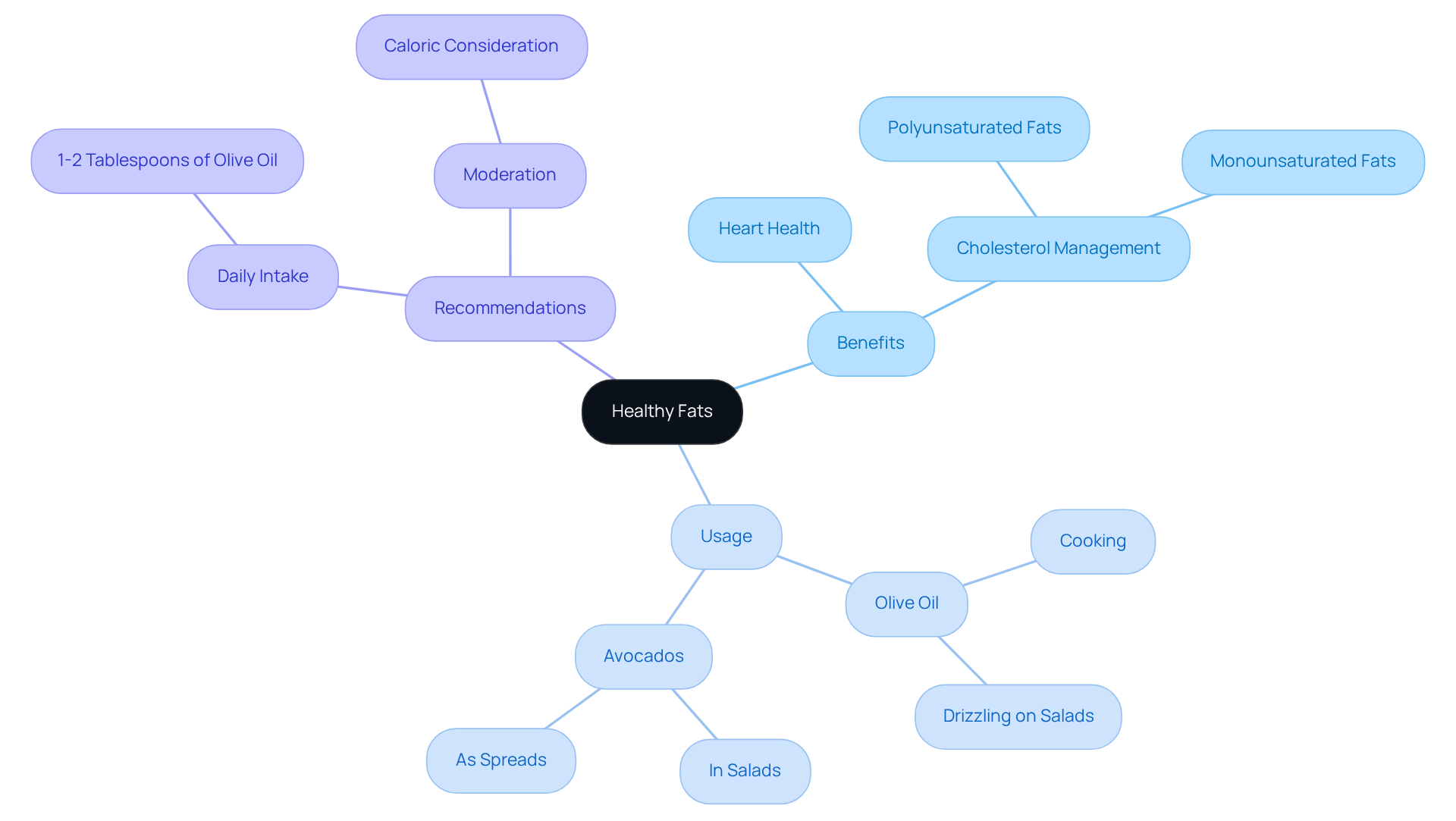
As we age, it becomes increasingly important to prioritize our health, especially by following a heart friendly diet. Many elderly individuals may not realize the impact processed foods can have on their well-being. These foods often contain harmful trans fats and excessive sugars, which can lead to weight gain, elevated cholesterol levels, and a heightened risk of cardiovascular disease. Research indicates that a heart friendly diet, which is low in trans fats, can significantly prevent harm to heart health, especially for seniors.
By shifting our focus to whole, minimally processed foods—like fruits, vegetables, whole grains, and lean proteins—we can greatly improve our nutritional intake. This not only helps in enhancing overall health but also supports our heart. Many dietitians recommend adopting a Mediterranean-style diet, which is rich in unprocessed foods, as a way to mitigate these risks. This approach not only aids in weight management but also aligns with a heart friendly diet, making it an essential strategy for older adults who wish to maintain a healthy lifestyle.
Have you considered how your dietary choices affect your health? Embracing this shift toward healthier eating can be a positive step. Remember, you are not alone on this journey; support is available to help you make these changes. Together, we can work towards a healthier future.
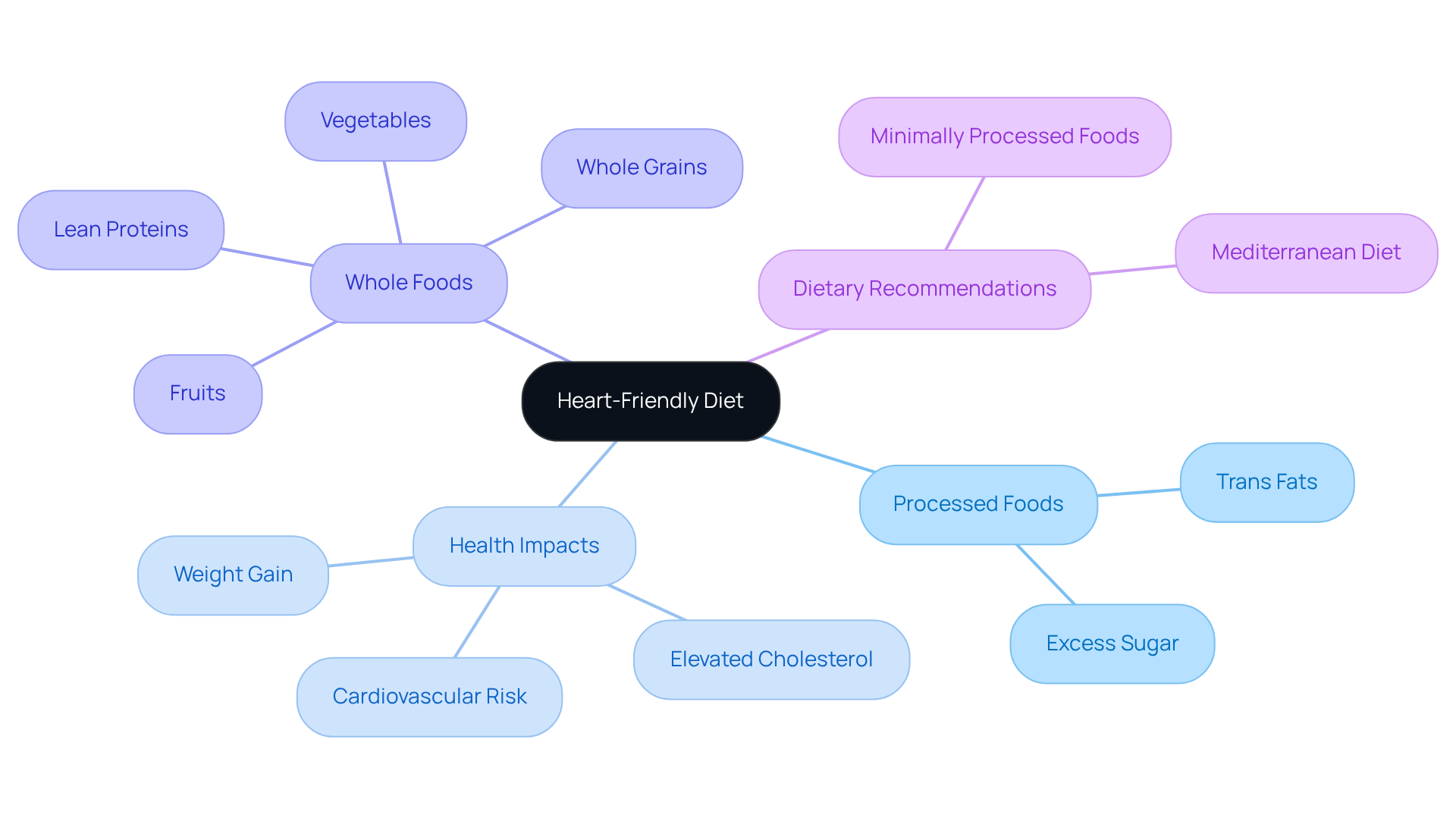
Effective portion control is essential for older adults to manage their weight and prevent overeating. Have you ever noticed how the size of your plate can influence how much you eat? Using smaller plates, measuring serving sizes, and being attentive to your hunger cues can significantly aid in maintaining a balanced diet.
Research indicates that larger food portions often lead to increased consumption. For instance, studies show that individuals tend to eat more when served larger portions, which can lead to excessive calorie intake. This makes it crucial for older adults to be mindful of their serving sizes. Nutritionists stress that understanding standard portion sizes—
can empower you to make healthier choices.
Additionally, practicing mindful eating can be a wonderful way to enhance your weight management efforts. Savoring each bite and recognizing feelings of fullness can lead to improved dietary habits. Recent studies have shown that these mindful practices can lead to better cardiovascular outcomes, highlighting the importance of a heart friendly diet and portion control in fostering overall well-being.
Furthermore, staying hydrated is an important part of your dietary recommendations. Have you considered how much water you drink each day? Consulting healthcare professionals for personalized dietary advice can provide additional support in managing portion sizes effectively. Remember, you are not alone in this journey, and there are resources available to help you thrive.
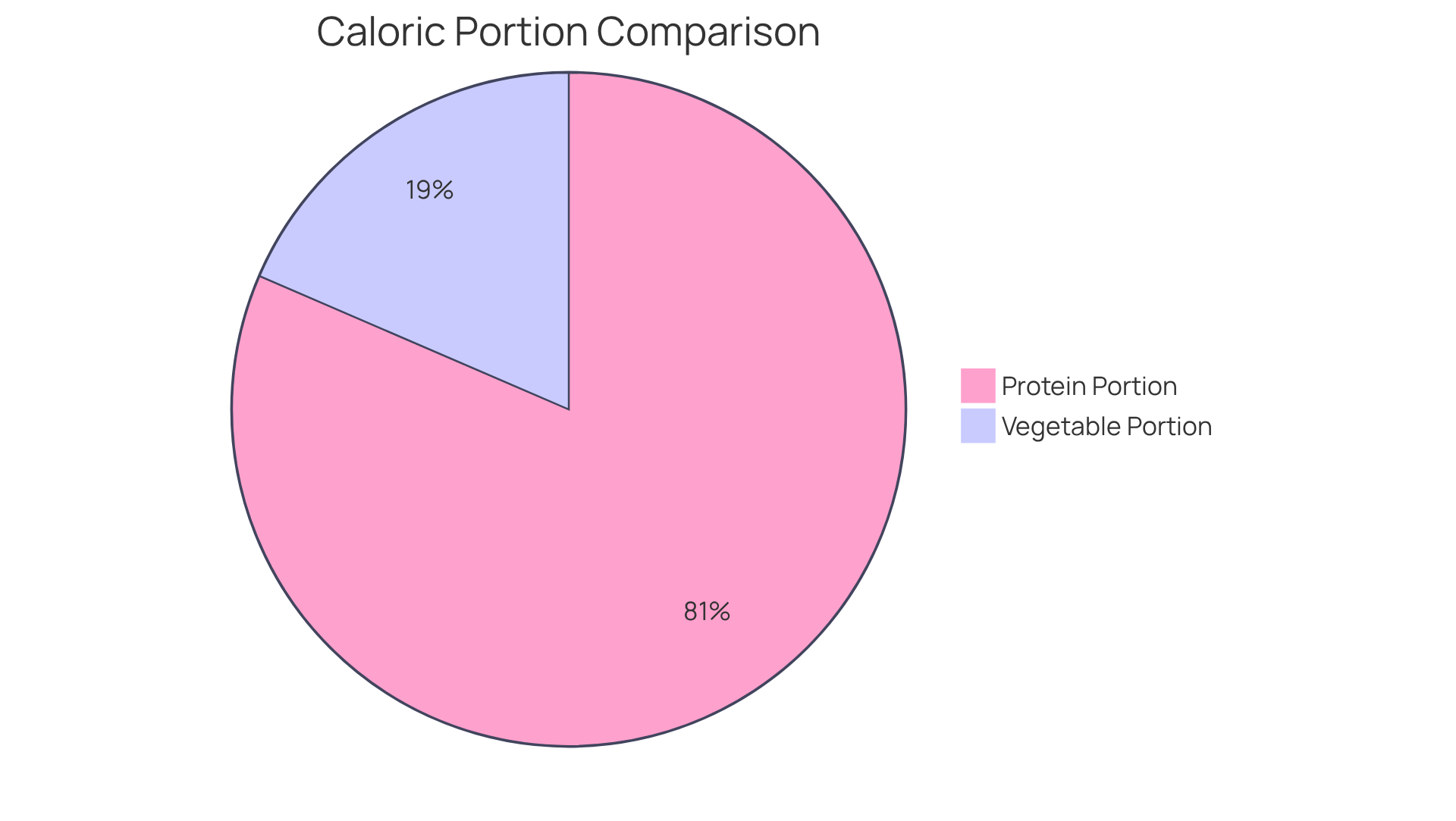
Maintaining hydration is vital for older adults. Sufficient fluid consumption plays a crucial role in a heart friendly diet, greatly aiding cardiovascular function and overall well-being. Research shows that older adults often have a lower percentage of total body water, making them more susceptible to dehydration. In fact, up to 40% of elderly individuals may be chronically underhydrated. To maintain optimal hydration, seniors should aim for a daily intake of approximately 8 to 13 cups of water, tailored to their individual needs. This recommendation aligns with guidelines from the National Academy of Medicine, suggesting 13 cups for men and 9 cups for women aged 51 and older.
In addition to this, incorporating water-rich foods, such as fruits and vegetables, can further enhance hydration levels. Foods like watermelon, cucumbers, and strawberries not only provide essential nutrients but also contribute to fluid intake. Establishing a routine—such as drinking water after using the restroom—can promote better hydration habits.
Furthermore, recent studies indicate that adequate hydration may assist in preventing or slowing alterations that lead to cardiac failure. Maintaining adequate fluid levels is important for a heart friendly diet, as it can help reduce the risk of developing heart-related issues, especially in older adults who may be on medications that increase fluid loss. Medical experts stress that maintaining hydration is as crucial as adopting a heart friendly diet that lowers salt consumption for promoting cardiovascular well-being. As Natalia Dmitrieva, Ph.D., noted, drinking enough water and staying hydrated, similar to reducing salt intake, are important components of a heart friendly diet and may help reduce long-term risks for heart disease.
Therefore, seniors should prioritize hydration as part of their daily wellness routine. By doing so, they can enhance their cardiovascular health and overall quality of life.
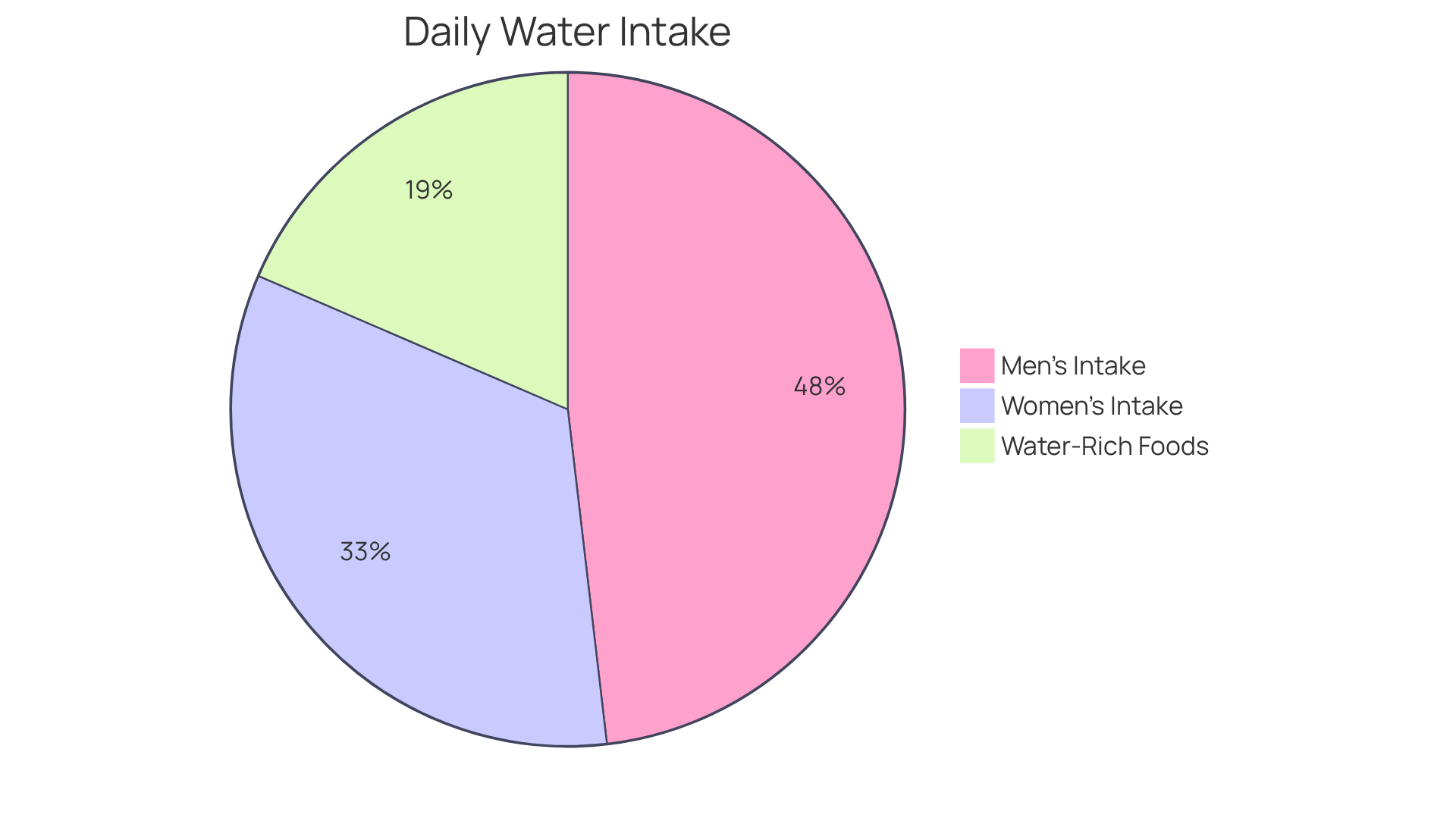
Embracing a heart-friendly diet is essential for seniors who wish to enhance their cardiovascular health and overall well-being. It's important to recognize the value of personalized dietary recommendations and the positive impact that nutrient-dense foods—such as fruits, vegetables, whole grains, lean proteins, and healthy fats—can have on heart health. By making informed choices and prioritizing nutrition, older adults can significantly reduce their risk of cardiovascular diseases while enhancing their quality of life.
Consider the benefits of adopting dietary patterns like the Mediterranean and DASH diets. These approaches emphasize low sodium and healthy fats, encouraging the consumption of fresh produce. Additionally, the importance of:
cannot be understated. Together, these strategies contribute to a heart-friendly diet that supports seniors in managing their health effectively.
Ultimately, the journey to better heart health is a collaborative effort. Seniors are encouraged to take proactive steps by consulting healthcare professionals for personalized dietary advice and support. By prioritizing a heart-friendly diet, individuals can not only improve their cardiovascular health but also enjoy a more vibrant and fulfilling life. Remember, every small change counts, and together, a healthier future is within reach.
What is the focus of Amavita Heart and Vascular Wellness?
Amavita Heart and Vascular Wellness focuses on providing personalized dietary recommendations to manage cardiovascular health, particularly for seniors, by tailoring dietary plans to individual medical conditions, preferences, and lifestyle factors.
What are some key components of a heart-friendly diet recommended for seniors?
A heart-friendly diet for seniors includes nutrient-dense foods such as fruits, vegetables, whole grains, lean proteins, and healthy fats. It is also important to limit saturated fats, sodium, added sugars, and processed foods.
How can regular meetings with healthcare professionals benefit older adults regarding dietary plans?
Regular meetings with healthcare professionals or registered dietitians help ensure that dietary plans align with the evolving wellness needs of older adults, supporting proactive steps toward improved cardiovascular health.
What is the Mediterranean diet and how does it benefit heart health?
The Mediterranean diet emphasizes healthy fats from sources like olive oil and avocados, along with fresh fruits and vegetables. It is associated with a lower risk of cardiovascular disease and stroke, making it beneficial for older adults.
What are some specific foods recommended in the Mediterranean diet?
The Mediterranean diet encourages the inclusion of nuts, seeds, oily fish for omega-3 fatty acids, and moderate consumption of alcohol, particularly red wine.
What is the DASH diet and what are its main features?
The DASH diet focuses on low sodium consumption and emphasizes a diet rich in nutrient-dense foods such as fruits, vegetables, whole grains, and lean proteins. It is designed to help manage blood pressure and promote cardiovascular health.
What is the recommended daily sodium intake for the DASH diet?
The DASH diet recommends a daily sodium intake of 1,500mg to 2,300mg to support cardiovascular health and reduce risks associated with hypertension.
What recognition has the DASH diet received?
The DASH diet has been recognized as the number 1 'Best Heart-Healthy Meal Plan' and 'Best Strategy for High Blood Pressure' in 2025 by U.S. News & World Report.
How can individuals effectively incorporate Mediterranean-inspired meals into their diet?
To incorporate Mediterranean-inspired meals, it may be helpful to consult with a doctor or registered dietitian for personalized guidance and support in creating meal plans that align with health goals.
What is the overall message of Amavita Heart and Vascular Wellness regarding heart health?
Amavita Heart and Vascular Wellness emphasizes the importance of personalized nutrition and dietary approaches to enhance cardiovascular health and overall well-being, encouraging older adults to take proactive steps in their health journey.